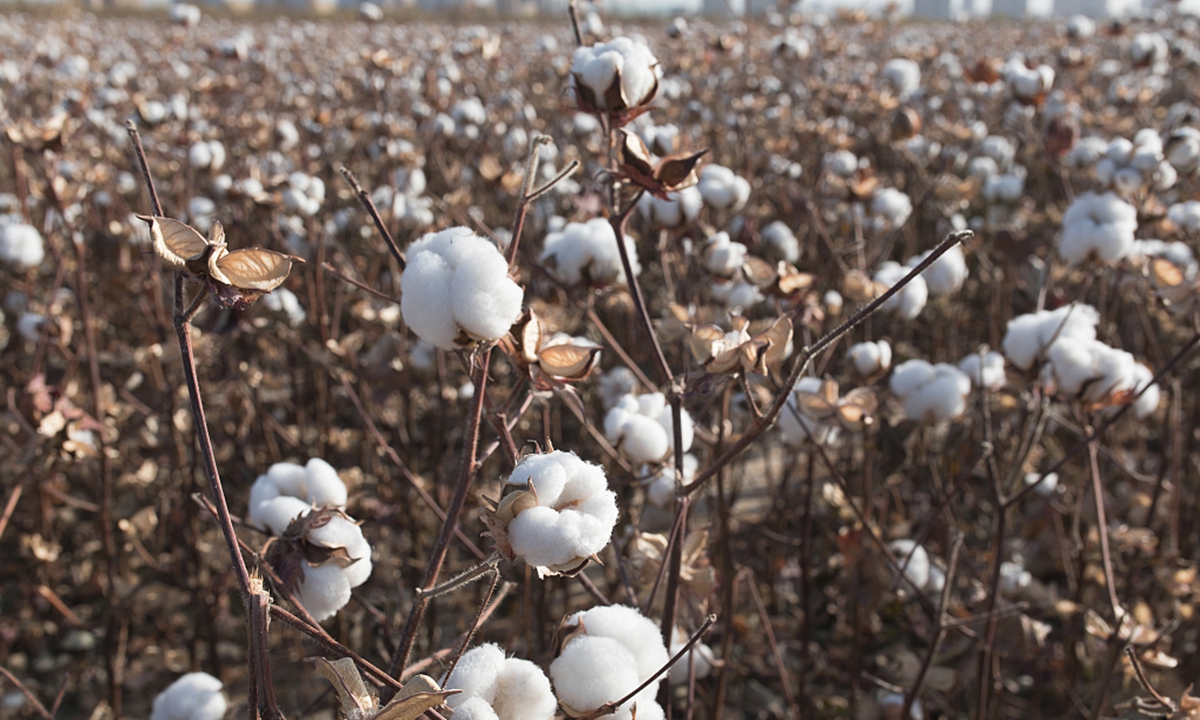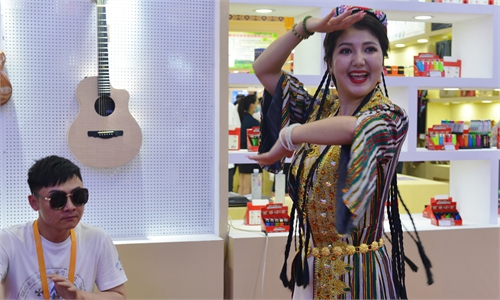Export-oriented Xinjiang apparel firms eye domestic market amid Western crackdown
Chinese firms need to foster global apparel brands

Xinjiang cotton Photo: VCG
Amid a crackdown by the US and other Western countries on Chinese enterprises based in northwestern Xinjiang, some of the firms have noted that their exports have not been affected much, and in some cases their exports have even risen.
And, other companies based there said that they are actively exploring domestic sales channels, as uncertainties such as the Western crackdown and the pandemic make the Chinese market a priority to avert risks.
The fifth China Brand Day kicked off on Monday in Shanghai and online, with enterprises from all over China participating in the event, including companies from Northwest China's Xinjiang Uygur Autonomous Region.
Liu Haifeng, CEO of China Colored-Cotton Group, told the Global Times on Monday that at present, the company now focuses on selling in the domestic market, as its export volume has been relatively small.
"The influence of the boycotts of Xinjiang cotton by some Western countries is limited, and our foreign trade has not been greatly affected. South Korea and Japan are two of our major export destinations, and they will remain as our priorities.
"Exports to Europe have dropped slightly," said Liu, adding that due to the support of Chinese consumers at home, the number of orders has increased by more than 20 percent compared with last year.
The company said that it has the largest colored-cotton planting base in China. The output of natural-colored cotton in Xinjiang accounts for 95 percent of the production in China, and about 50 percent in the world.
As some export-oriented Xinjiang enterprises get support from home consumers, they have started to engage in the transition from exports to domestic market promotion. Some Xinjiang enterprises told the Global Times, on condition of anonymity, that they are actively seeking domestic sales channels.
"China's steady economic growth has created a stable market and rising demand. On the contrary, repeated virus outbreaks in many foreign countries have increased uncertainties in foreign trade, and the restriction imposed by some Western countries on Xinjiang cotton has brought uncertainties to the sector. Enterprises moved to promote domestic sales in order to avoid risks," an analyst and investor surnamed Cheng told the Global Times on Monday.
An agricultural enterprise said that it is cooperating with Alibaba's Tmall, one of the largest e-commerce platforms in China, to expand domestic market sales.
A manager of public cotton company in Xinjiang that engages in cotton picking, gathering, cleaning, processing, embossing and packaging, told the Global Times on Monday that the "Xinjiang cotton" issue did not have much negative impact on the company's stock prices, but it did force it to give priority to independent research and development on new products and to seek domestic procurement.
"Our company has brought to the exhibition one of most high-end cotton pickers in the world. It is 30-40 percent more efficient than ordinary machines, and costs less than two-thirds of the price of its American counterparts, while the performance is almost the same.
"Now we have mastered more than 90 percent of the key technologies. We will continue to expand the proportion of home-made components and to develop new technologies," said the manager.
He added that domestic orders are on the rise, as buyers realize that uncertainties abroad can affect the supply of cotton-processing equipment and related services. Enterprises in Xinjiang cannot go back to the era when cotton was picked by hand.
The machine-picking rate has exceeded 90 percent in northern Xinjiang, according to data released by the Department of Agriculture and Rural Affairs of Xinjiang. The rate is expected to reach 88 percent in whole Xinjiang this year, said the agriculture ministry.
"The battle over cotton is essentially a battle of economic interests. China is the world's largest consumer and second-largest producer of cotton. By impairing exports of Xinjiang cotton, cotton produced in the US, Australia and other Western countries will have an expanded market," said Wang Chikun, an independent economist.
According to statistics, China produced 5.91 million tons of cotton in 2020, of which Xinjiang produced 5.16 million tons, accounting for 87 percent. China's demand for cotton reached about 8 million tons last year, per statistics from China Cotton Industry Association sent to the Global Times, which means nearly 2 million tons of cotton relied on imports.
"In essence, Western countries' boycott of Xinjiang cotton is the struggle for interests. We must have a clear understanding of this. There is still a big gap between domestic and foreign clothing retail brands.
"Only when our brands are strong in the world, can we have control over the supply chain and not be controlled by others," Wang noted.

